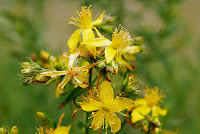This festival is primarily a Celtic fire festival, representing the middle of summer, and the shortening of the days on their gradual march to winter. Midsummer is traditionally celebrated on either the 23rd or 24th June, although the longest day actually falls on the 21st of June. The importance of the day to our ancestors can be traced back many thousands of years, and many stone circles and other ancient monuments are aligned to the sunrise on Midsummer's Day. Probably the most famous alignment is that at Stonehenge, where the sun rises over the heel stone, framed by the giant trilithons on Midsummer morning.
In antiquity midsummer fires were lit in high places all over the countryside, and in some ares of Scotland Midsummer fires were still being lit well into the 18th century. This was especially true in rural areas, where the weight of reformation thinking had not been thoroughly assimilated. It was a time when the domestic beasts of the land were blessed with fire, generally by walking them around a fire in a sun-wise direction. It was also customary for people to jump high through the fires, folklore suggesting that the height reached by the most athletic jumper, would be the height of that year's harvest.
After Christianity became adopted in Britain, the festival became known as St John's Day (St John's Fire as depicted by Nikolai Astrup, 1912 .. see above) and was still celebrated as an important day in the church calendar; the birthday of St John the Baptist. Traditionally St john's Eve (like the eve of many festivals) was seen as a time when the veil between this world and the next was thin, and when powerful forces were abroad. Vigils were often held during the night and it was said that if you spent a night at a sacred site during Midsummer Eve, you would gain the powers of a bard, or on the down side you could also end up utterly mad, deaf, or be spirited away by the fairies.
Indeed, St Johns Eve was a time when fairies were thought to be abroad and at their most powerful (hence Shakespeare's Midsummer Night's Dream).
St John's Wort was also traditionally gathered on this day, thought to be imbued with the power of the sun. Other special flowers (Vervain, trefoil, rue and roses) were also thought to be most potent at this time, and were traditionally placed under a pillow in the hope of important dreams. especially dreams about future lover.
The festival of Midsummer is still important to pagans today, including the modern day druids who (barring any trouble) celebrate the solstice at Stonehenge in Wiltshire. For them the light of the sun on Midsummer's Day signifies the sacred Awen. For witches the summer solstice forms one of the lesser sabbats, their main festivals being Beltane (1st May) and Samhain (1st November). Some occultists still celebrate the ancient festivals around 11 days later than our calendar; this marks the 11 days which were lost when the Gregorian calendar replaced the Julian calendar in 1751.
The above information taken from "www.mysteriousbritain.cu.uk/





Imagine what it must have been like to live in the 'times of magic'. There is no magic in the world anymore.
ReplyDeleteAlthough I imagine living in times of magic would have been frightening through lack of knowledge, I agree we could do with a little magic and mysticism in today's dreary world.
DeleteThank you. In some ways I think our lives have been diminished as we replace magic with science. But not in my heart - never in my heart.
ReplyDeleteThere will always be room for magic and romance in my heart EC; after all we both still believe in unicorns. Science is imperative to our well being but perhaps too much knowledge does overpower the magic that once existed.
ReplyDeleteTimes were more interesting back then with all the rituals etc. Now it's all work for money then spend the money, start over. The only rituals left are sports.
ReplyDeleteThere is still magic and mysticism for those that care to find it though.
Christians changed it to the 24th. The correct date is the 21st.
ReplyDelete